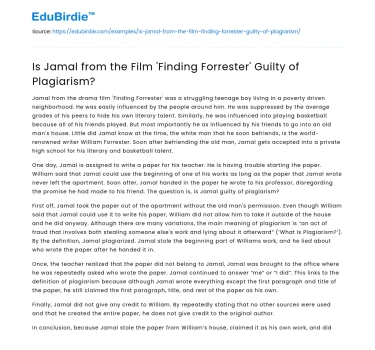Jamal from the drama film 'Finding Forrester' was a struggling teenage boy living in a poverty driven neighborhood. He was easily influenced by the people around him. He was suppressed by the average grades of his peers to hide his own literary talent. Similarly, he was influenced into playing basketball because all of his friends played. But most importantly he as influenced by his friends to go into an old man's house. Little did Jamal know at the time, the white man that he soon befriends, is the world-renowned writer William Forrester. Soon after befriending the old man, Jamal gets accepted into a private high school for his literary and basketball talent.
One day, Jamal is assigned to write a paper for his teacher. He is having trouble starting the paper. William said that Jamal could use the beginning of one of his works as long as the paper that Jamal wrote never left the apartment. Soon after, Jamal handed in the paper he wrote to his professor, disregarding the promise he had made to his friend. The question is, is Jamal guilty of plagiarism?
Save your time!
We can take care of your essay
- Proper editing and formatting
- Free revision, title page, and bibliography
- Flexible prices and money-back guarantee
First off, Jamal took the paper out of the apartment without the old man's permission. Even though William said that Jamal could use it to write his paper, William did not allow him to take it outside of the house and he did anyway. Although there are many variations, the main meaning of plagiarism is “an act of fraud that involves both stealing someone else's work and lying about it afterward” (‘What Is Plagiarism?’). By the definition, Jamal plagiarized. Jamal stole the beginning part of Williams work, and he lied about who wrote the paper after he handed it in.
Once, the teacher realized that the paper did not belong to Jamal, Jamal was brought to the office where he was repeatedly asked who wrote the paper. Jamal continued to answer “me” or “I did”. This links to the definition of plagiarism because although Jamal wrote everything except the first paragraph and title of the paper, he still claimed the first paragraph, title, and rest of the paper as his own.
Finally, Jamal did not give any credit to William. By repeatedly stating that no other sources were used and that he created the entire paper, he does not give credit to the original author.
In conclusion, because Jamal stole the paper from William’s house, claimed it as his own work, and did not give credit to William, he is guilty of plagiarism.






 Stuck on your essay?
Stuck on your essay?

